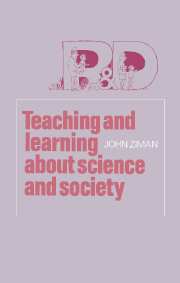Book contents
- Frontmatter
- Contents
- Introduction
- 1 Science education – for whom?
- 2 The hard core of science
- 3 Scientism and its manifestations
- 4 The social model of academic science
- 5 The R & D system
- 6 Controversial STS issues
- 7 Approaches to STS education
- 8 Enlarging science education
- 9 Getting STS education established
- Index
- Frontmatter
- Contents
- Introduction
- 1 Science education – for whom?
- 2 The hard core of science
- 3 Scientism and its manifestations
- 4 The social model of academic science
- 5 The R & D system
- 6 Controversial STS issues
- 7 Approaches to STS education
- 8 Enlarging science education
- 9 Getting STS education established
- Index
Summary
The knowledge machine
For the politician or industrial manager, it is all too easy to think of science as a more or less self-contained machine for producing knowledge. The scientists are big wheels or small cogs, driven by competitive or bureaucratic interaction. The whole thing is rather like a gold dredge, digging away at the primary ore of natural phenomena, passing it through the grinding and separating plant, and extracting fully refined knowledge. The main question seems to be how to take control of the machine, and direct it towards the richest lodes, to get the most profitable output. This instrumental attitude (§6.2) is implicit, for example, in the title of J. D. Bernal's famous book – The Social Function of Science’. We may even discuss the social role of science, as if it were an actor in a human drama, a self-conscious being with an autonomous personality.
But the image of science as a machine or an organism is fundamentally misleading. The metaphor implies a much higher degree of structural coherence and integration than is ever to be found in reality. It encourages big, bold, silly questions like ‘How can science get us out of this mess?’ or ‘Is science a good thing?’, for which there are only vain silly answers. If STS education is to make any progress, it must probe deeper than this into the complex web of social relations in which science is entangled.
Information
- Type
- Chapter
- Information
- Teaching and Learning about Science and Society , pp. 68 - 88Publisher: Cambridge University PressPrint publication year: 1980
Accessibility standard: Unknown
Why this information is here
This section outlines the accessibility features of this content - including support for screen readers, full keyboard navigation and high-contrast display options. This may not be relevant for you.Accessibility Information
- 1
- Cited by
